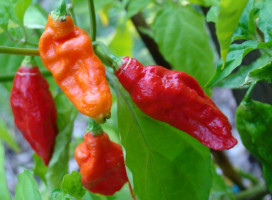
A study by a team of researchers at the Marshall University Joan C. Edwards School of Medicine provides the first published in-depth description of the anti-cancer activity of capsaicin sustained-release formulations.
Capsaicin is naturally found in chilli peppers and is the agent that provides the hot and spicy taste when eating chilli peppers. Sustained-release formulations of capsaicin are being explored for extended anti-cancer activity.
Recently published in Pharmacology & Therapeutics, a leading medical review journal in the field of pharmacology, the article chronicles the growth-suppressive activity of sustained-release capsaicin drugs, including solid dispersion systems, liposomes, phospholipid complexes and nanoparticles.
This is the first publication to provide an in-depth description of the anti-cancer activity of capsaicin sustained-release formulations. The research team was led by Associate Professor of Biomedical Sciences Piyali Dasgupta, Ph.D., and Professor of Biomedical Sciences Monica Valentovic, Ph.D.
“This review article is the first to provide a comprehensive overview of capsaicin formulations in human cancer,” said Dasgupta, corresponding author on the publication. “Previous publications in the literature only briefly address sustained-release formulations of capsaicin.”
The nutritional agent capsaicin displayed robust growth-inhibitory activity in a diverse array of human cancers. However, the clinical applications of capsaicin as a viable anti-cancer agent were hindered by three factors—poor solubility, low bioavailability and spicy flavour.
“Oral use of capsaicin is associated with unfavourable side effects such as stomach cramps, nausea, a burning sensation in the gut and gastrointestinal irritation,” said Valentovic, a senior author on the publication.
“A strategy to overcome these drawbacks is the development of different delivery systems, such as encapsulating capsaicin in long-acting sustained release drug delivery systems could allow for more consistent capsaicin levels that could be more efficient as anti-cancer agents.”
In addition to Dasgupta and Valentovic, clinical faculty Maria T. Tirona, M.D., Joshua Hess, M.D., and Paul Finch, M.D., contributed to the publication as well as co-authors Stephen Richbart, Justin Merritt, Ashley Cox, Emily Moles and Katie Brown.
Source: Marshall University Joan C. Edwards School of Medicine